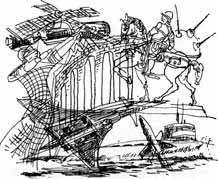As New Year's Day was approaching, many Chinese were engaged in some supposedly important thinking while watching the television documentary series The Rise of Big Powers.  The DVDs and manuscripts of the series, printed as a series of books, are among China's bestsellers. The DVDs and manuscripts of the series, printed as a series of books, are among China's bestsellers.
The purpose of the series was obvious: Now that the nation has become a major global trading power and a key partner in many international businesses, it is about time for the Chinese people to think about, not just dream about, their role in the world. In fact, some think-tank researchers have been talking about China's peaceful rise for the last few years. The series' producers and writers did not need a lot of political background to conceptualize the documentary. They just had to share their potential viewers' rising sense of patriotism and sense of success in development. It is always good for people to take the time to learn about others' experiences and think about what they can do for the world besides building ever larger houses and buying ever more things for themselves. And needless to say, China's rise in economic power in the last three decades has been achieved by hard work in a largely peaceful process, which its people deserve to be proud of. However, three decades are just a short period of time. China's development must last for a long time before it can substantially improve the general welfare of its people. And the rebuilding of such a colossal country is bound to involve many tasks rarely required in other countries. There are plenty of cases in world history where big powers' rise was interrupted by their own mistakes, from waging stupid wars to ignoring environmental changes. China itself has many stories to tell about its past dynastic ups and downs. Rather than presenting their viewers with a series on the rise of big powers, Chinese television programmers would do better to produce a series showing how some nations' big-power dreams were dashed, and how others, after staying awhile in the world's club of big powers, hopelessly collapsed, never managing to pull themselves together again. A television series on the Fall of Big Powers may not appeal to the general psychology of a rapidly developing nation. But it would give people a much more valuable lesson, presenting them with the opportunity to reflect on things to avoid when their nation is becoming more powerful and things to do before it is too late. To be sure, wasteful behavior in the name of development is one of the most salient problems undermining China's quest for future importance. The pompous buildings of government offices from Beijing all the way to border towns exemplify how widespread the problem is. Small wonder that the nation has failed to meet its energy saving targets, among the few targets not yet met in China's development program. But in the long run, China has no way to sustain its development ambitions without effective ways to conserve natural resources. Promoting frugality is therefore one of the things that China should start doing now to curb its wasteful habits, especially those of its officials. And this considered, government reform, particularly routing out official corruption and checking officials' wasteful habits, is not only a good thing for China but also an important service China can do for the whole world. (China Daily 01/15/2007 page4)
|

